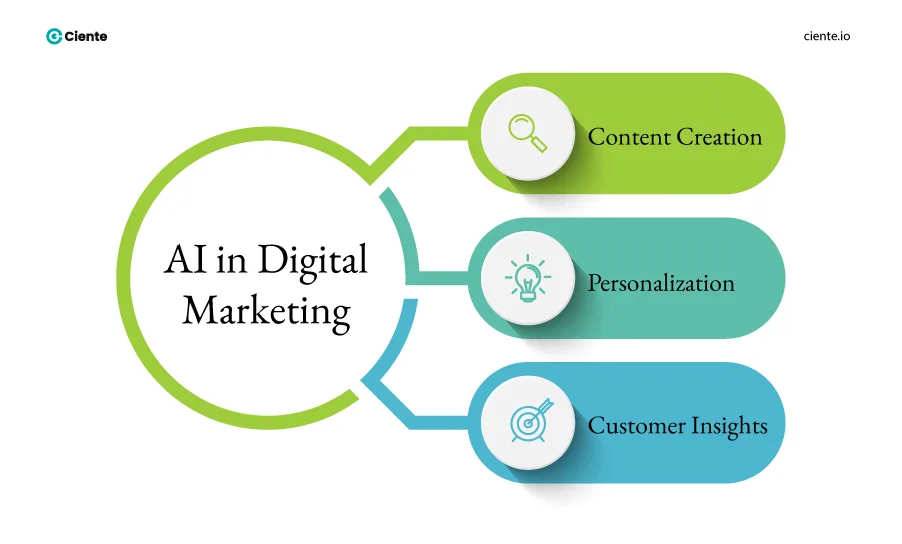Introduction
Will digital marketing and SEO agencies lose their jobs? It’s hard to say, but what we know for sure is that digital marketing is undergoing a massive shift thanks to artificial intelligence and in particular generative models. This includes text models such as ChatGPT or Gemini, and also images models like Stable Diffusion and MidJourney.
While the impact of AI spans all sectors of industry, its role in digital marketing and in particular in Search Engine Optimization will be transformational. This shift isn’t just about automation and efficiency; it’s about fundamentally changing how marketers approach content creation, content marketing, audience engagement, and data analysis.
I recently became very interested in this space. I have over 20 years of experience in technology, including at Google and when I saw generative AI I realized that it had the potential to transform the digital marketing industry. Because of this my brother David and I started a new company (https://torseoppc.com/). Let me give you a few insights into how I think the digital marketing world is going to change.
AI’s Role in Changing Marketer’s Day-to-Day
AI technologies are transforming the digital marketing space by enabling more personalized content creation, predictive analytics, and enhanced customer experiences. Here’s how:

1. Content Creation:
Large language models and generative image models and the many tools that use them can generate content ideas, draft articles, and even optimize content for SEO more efficiently than ever before. This includes not just the text but the entirety of the content, making it easier to deliver comprehensive solutions such as Digital PR Service. These advancements help marketers meet the constant demand for fresh, relevant content, while also enhancing their digital PR efforts. Most importantly, marketers who leverage these tools will be much more efficient, whereas those who don’t may be left behind. As a result, we will see vastly more content created for marketing purposes—generally of higher quality and at a lower cost than before.
2. Personalization:
AI excels at personalizing user experiences. From email marketing to product recommendations, AI can analyze individual user actions and preferences to deliver highly targeted content. Up until now it was impossible to create truly personalized content because nobody could run a million different campaigns. But now it’s really possible to create completely personalized creatives, one for every possible client. And it’s possible to track the effectiveness of all these campaigns and creatives.
3. Customer Insights:
AI-powered analytics can dive deep into user data to uncover insights about consumer behavior, preferences, and trends, enabling marketers to tailor their strategies more effectively. We have started to see truly automated marketing platforms and it’s inevitable that more and more of the rudimentary tasks of digital marketing will be automated by the main advertising platforms.
Adjustments for Marketers
Marketers need to embrace these AI tools, learning how to integrate them into their strategies without losing the human touch that consumers value. This means:
- Staying informed about the latest AI technologies and understanding how they can benefit their specific marketing goals. And jumping quickly to use these tools before their competitors do. It’s worth spending some time experimenting with new means of content creation.
- Balancing AI-driven content and personalization with genuine, engaging experiences that resonate with their audience. At the end of the day we all like stories about real people, so it’s important to keep a bit of a personal touch.
- Ensuring content quality and relevance remain high, as search engines become smarter at identifying AI-generated content that lacks depth or value. We may see an arms race between people creating content using AI and search engines identifying low quality or duplicate content. It will be important to monitor the effectiveness of AI generated content more closely than before.
Search Engines’ Adaptation
Google and other search engines are continually refining their algorithms to prioritize valuable, relevant, and high-quality content. As AI becomes more prevalent in content creation, these platforms are developing more sophisticated ways to distinguish between content that provides genuine value and low-quality, AI-generated content.
This doesn’t mean that AI generated content is going to be penalized or ranked lower. As long as it’s useful for users it would rank. But it means that the bar to get content in the first page or in the first organic search result is going to be higher.
Tips for Marketers
1. Use Gen AI to create content:
Use AI tools for keyword research, content optimization, and
strategy refinement. However, always review and tweak AI suggestions to ensure they align with your brand’s voice and goals. The advent of LLMs and other generative AI doesn’t mean that the usual steps in digital marketing and SEO are not necessary any more, it just means that everyone is going to have more powerful tools and it will be important to adapt and compete.
2. Focus on Quality:
High-quality, engaging content is still king. Use AI to enhance your content, not replace the creative process.
3. Stay Human:
Incorporate personal stories, user-generated content, and engaging narratives into your marketing to keep the human element alive. I think the key would be the combination of human guidance, AI generation and some final human editing. AI is very good at generating drafts, but not so good at writing with your own personality.
Conclusion: The Broader Trends
While tools like Alexa and previous generation chatbots haven’t significantly changed the marketing landscape, it’s clear that AI, in particular generative models will have a profound impact. The key for marketers is to use AI as a tool to enhance their strategies, not as a replacement for human creativity and insight. As AI continues to evolve, staying adaptable, informed, and focused on creating genuine connections with your audience will be essential for success in the digital marketing realm.
Author’s Bio
Javier is a technology executive, investor and entrepreneur. As Technical Director at the CTO Office Javier drives long term technical strategy for Google Cloud. During 15 years at Google, Javier has led technical work and managed teams in Search, Ads, Supply Chain and Cloud. Recently he has been helping organizations use Cloud, Machine Learning and Generative AI.





